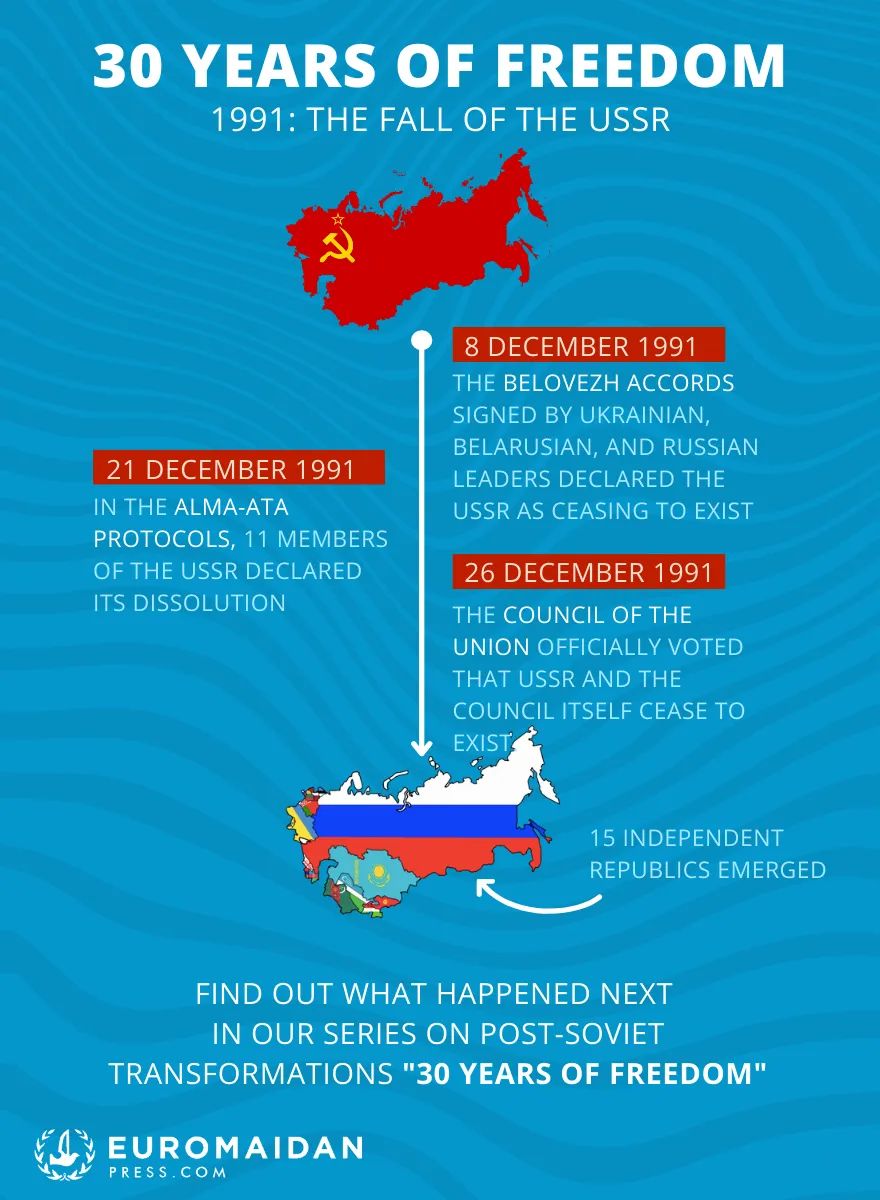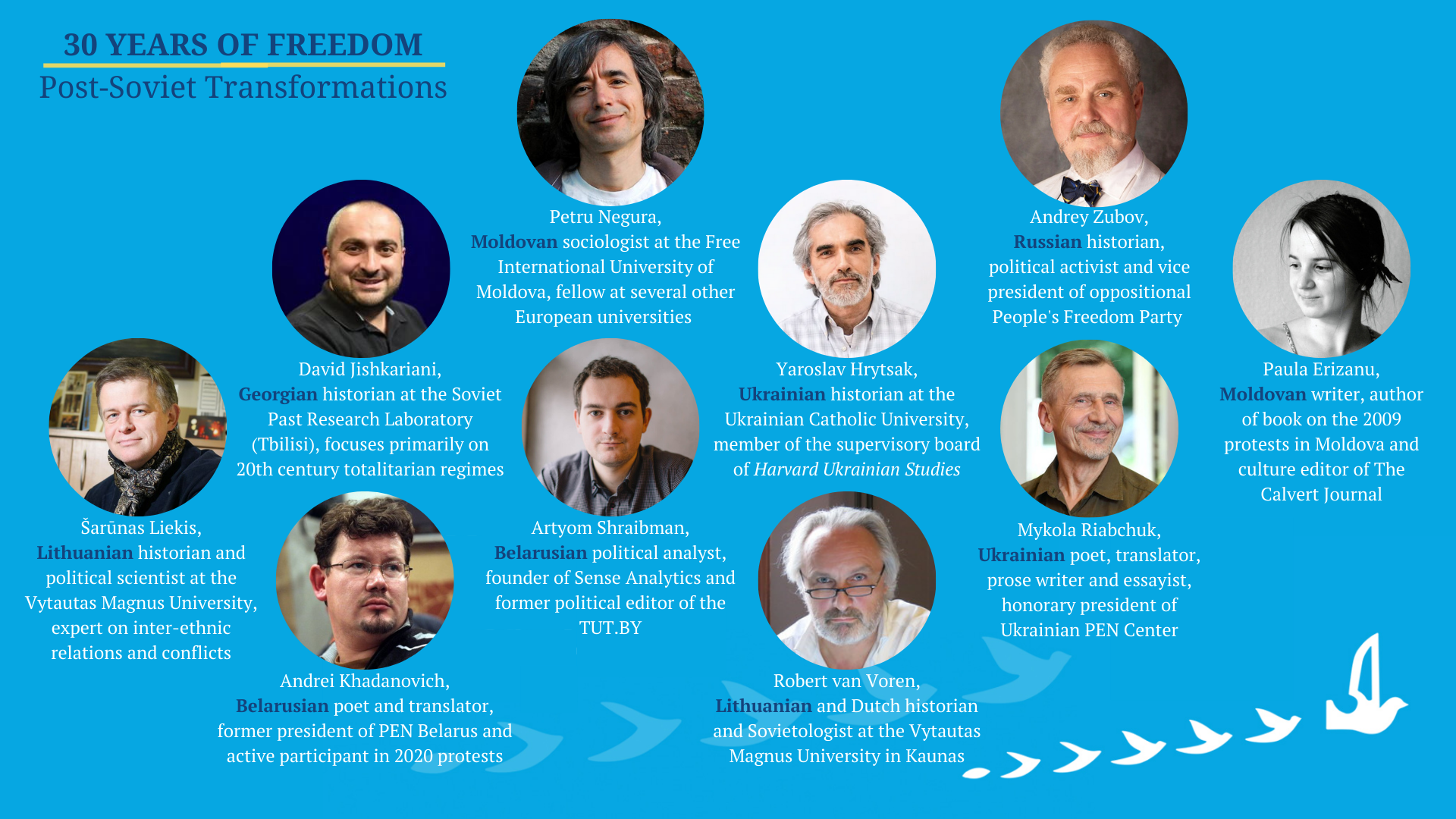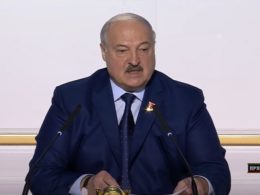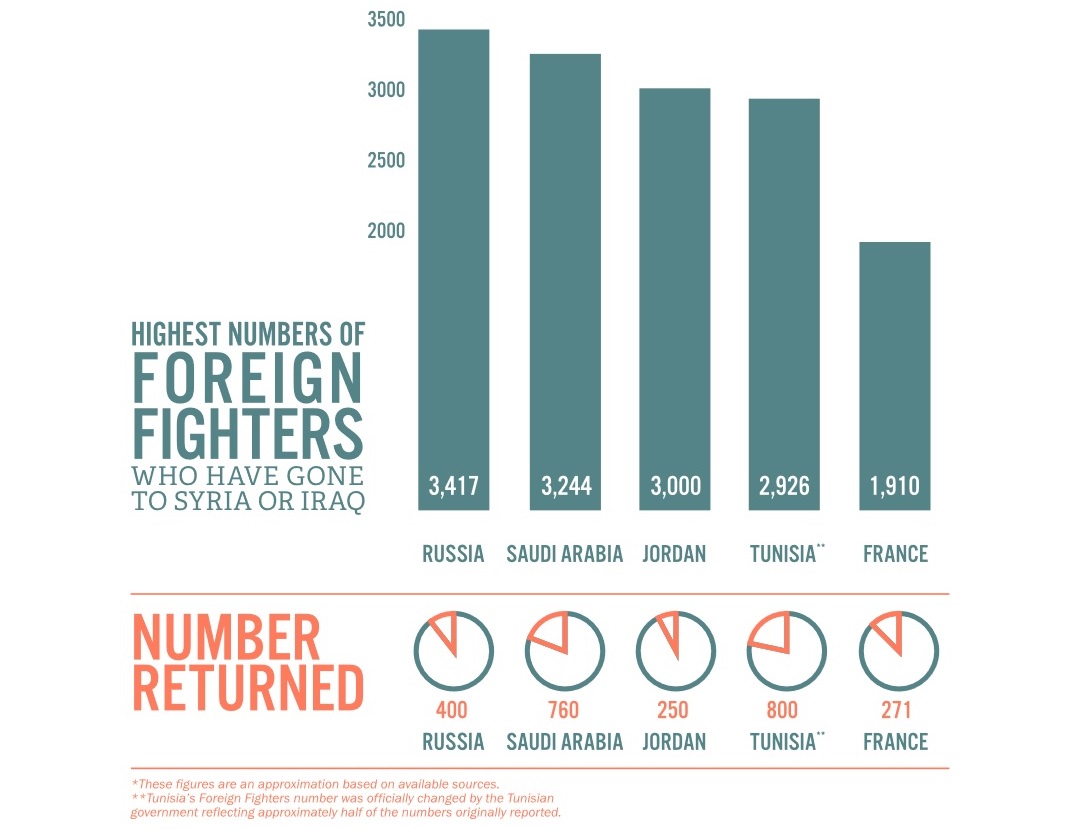- what decommunization really means;
- what country had the best post-Soviet economic reforms;
- how oligarchic pluralism saved Ukraine and why there are so-called “good oligarchs”;
- why the only way to deter Russia is realpolitik and becoming more powerful;
- how Georgia's view Stalin differs from other post-Soviet states;
- why there is no conventional right-wing and left-wing parties in Moldova and not only there;
- how the Belarusian national identity established itself despite Lukashenka’s policies;
- the vision of Russia promoted by local opposition;
- why the Soviet ethnic policy laid foundations for contemporary Russian wars.
“The label [of post-Soviet space] has always been problematic—and 30 years after its introduction, the time to retire it has come. The term misleadingly implies a degree of political, social, and economic coherence among a diverse set of countries that includes my own, Ukraine... Millions of young Ukrainians have not lived a single day in the Soviet Union, and many of them now have children of their own. The idea of a 'common Soviet past,' already fading among older generations, means little to them. These young people have lived through two revolutions—first the 2004 Orange Revolution and then the 2014 Revolution of Dignity—and an ongoing war with Russia. For them, Ukraine has never gained independence; it has always been independent,” Ukraine’s minister of Foreign Affairs Dmytro Kuleba wrote in his August 2021 article.
Indeed, a single post-Soviet spaces is no more there as countries have underwent very different transformations. What remains common is a generation gap, a tension and, as Ukrainian essayist Mykola Riabchuk wrote, “great compulsion, as exercised by a quarter of the population, a minority that has managed to influence the majority-driven post-Soviet politics.” Although with a different pace in each country, the clock is now ticking against Putin and some of his local little helpers.
What remains common is a generation gap, a tension and, as Ukrainian essayist Mykola Riabchuk wrote, “great compulsion, as exercised by a quarter of the population, a minority that has managed to influence the majority-driven post-Soviet politics.” Although with a different pace in each country, the clock is now ticking against Putin and some of his local little helpers.
- Part One. Demolishing monuments not enough to destroy post-Soviet nostalgia, but property rights help | 30 Years of Freedom, p.1
- Part Two. The post-Soviet oligarchies and how they shaped national state politics | 30 Years of Freedom, p.2
- Part Three. How post-Soviet states reassess their national history and WWII | 30 Years of Freedom, p.3
- Part Four. How to stop Russian aggression in post-Soviet states? | 30 Years of Freedom, p.4
What decommunization really means
According to Andrei Zubov, Russian historian and vice president of oppositional People’s Freedom party, “at the top of the list of systemic decommunization is the restoration of property rights that were violated by the Communist regime.” Other speakers agree that decommunization of symbols and history truly impact only along with successful economic reforms.
“What was robbed by the Communists returns to the ancestors of those who were robbed. This main principle is formulated in the 10.96 Declaration of PACE, in 1996. Nowhere, except in the Baltic states, was restitution of property conducted. This injustice erodes the very basis of democracy, even in those countries, such as Moldova or Ukraine, where politicians and civil society have sincerely tried to build it,” Zubov says.
The policy of lustration, decommunization of history and symbols and ensuring responsibility and condemnation of Soviet crimes are the next steps of decommunization. Along with the Baltic states, Ukraine and to a large extent Moldova and Georgia have successfully implemented these steps. The latter three countries of “Associated Trio,” however, didn’t implement restitution of property.Ukrainian essayist Mykola Riabchuk adds that one may claim that decommunization is finished in Ukraine, but decolonization is not yet. Soviet slavery lasted for 70 years but even more important is the 200-year-long belonging to the Russian empire. The absence of republican solidarity and a weak self-association with Ukrainian statehood are the results of this long colonial status of Ukraine. The good news is related to the new generation which doesn’t carry colonial mental scars.
“This one-quarter minority has, in the past decades, grown up and matured, making up more than half of the population today and leaving Moscow no chance for Ukraine’s re-Sovietization, or an autocratic return,” Riabchuk states.
Which country did the best with post-Soviet privatization and economic reforms?
All countries have tried to build stable market economies but reached different levels of success. Of course, the Baltic states are the best reformers so far but some key differences remain even between Lithuanian, Latvian, and Estonian policies.Sarunas Liekis, Lithuanian historian and political scientist, claims that “Estonians did better because they were privatizing entire business entities.” Insted, In Lithuania, privatization was going on the basis of shareholding just like in Ukraine and Russia.
“In Estonia, when they found a buyer, the enterprise was sold as an autonomous entity with a governing body. At the very beginning, the flow of capital — especially Scandinavian — to Estonia was a lot,” Liekis says.
Today there is no Estonian dominance, although it was still visible a decade ago.Liekis also adds that from an economic perspective, the Baltic states joined the EU way too quickly, even though it was reasonable politically. Even though the Baltics avoided the formation of an oligarchy with strong influence on politics, they couldn’t avoid the emergence of the super rich, or “local latifundista.”
“It created a two-tier society: the ones who managed to get big money and the ones who became very poor because prices skyrocketed.”
Robert van Voren, a Lithuanian and Dutch historian notes that while the Baltic states have more balanced economic development than, for example, Ukraine, the three EU members still couldn’t avoid deep and painful social transformations with many people losing their jobs because of economic inefficiency and being forced to emigrate. This was mitigated only recently.Speaking about the Associated Trio, Ukraine, Georgia and Moldova, all three countries are not much behind the Baltics in terms of business freedoms. However, the common unresolved problem for these countries is an unreformed judiciary that facilitates a strong influence of oligarchs on politics.
How oligarchic pluralism saved Ukraine and why there are some “good oligarchs”
Ukrainian historian Yaroslav Hrytsak gives two reasons why Ukraine hasn’t become an authoritarian state like Russia. The deep historical reason is the long tradition of democracy and pluralism related to the Ukrainian Cossack state and Polish-Lithuanian commonwealth. The contemporary reason is oligarchic pluralism, unlike in Russia or Belarus.
“The advantage in Ukraine is that we have several oligarchs — and there is competition between those oligarchs. I think this element of competition is very important. We have a few channels, a few buttons, and no one has a monopoly.” he says.
Belarusian sociologist Artyom Shreibman elaborates further, that if there are many oligarchs — as is the case in Ukraine — it is very hard for an authoritarian like Yanukovych, for example, to consolidate power. Putin took several years to consolidate his power over Russian oligarchs. In Belarus, Lukashenka simply destroyed them outright.
“Thus, it’s next to impossible for revolutionary movements in Belarus— as in 2020/21 — to find allies among powerful individuals like oligarchs, because there are none,” Shreibman says.
Hrytsak also adds that he does not consider the oligarchs to be completely negative actors. Some of them were actively defending Ukraine against Russian aggression, supporting Ukraine’s military and the state, even if for personal interests, knowing that their business would be impossible after Russian occupation.
“They are definitely lucky — after all, we don’t know for sure how fairly or unfairly they acquired their millions. The point is that among them are those who think only about enrichment and those who actually think about what to do with their money...”
During the last 30 years, Ukraine has gradually moved from the outright oligarchic pluralism to a true democracy with strong grassroot movement. The key reform that separates Ukraine from the final goal of a fully democratic society is the judiciary reform.
Why the only way to deter Russia is realpolitik and becoming more powerful
The other thing upon which speakers agreed is that realpolitik is what happens now in central and eastern Europe, rather than the policy of values. The solution to Putin’s local conflicts and general rivalry between newborn democracies and rudiments of authoritarians is simple, “to become stronger,” as Lithuanian Sarunas Liekis said or a “better place for living” according to Moldovan sociologist Petru Negura.Andrei Zubov adds that if you can be a confident economic actor in a certain political system, then you feel loyalty to this system, like in the Czech Republic or Poland. The support for any regime, be it democratic or authoritarian, is closely linked to the economic prosperity of the population.Petru Negura names different popular proposals about how to reintegrate Transnistria into Moldova but thinks that until life in Moldova is much better than in Transnistria there are little chances of success.According to Sarunas Liekis, the integration of Ukraine, Moldova, and Georgia to the EU and NATO also depends on their strengths:
"The main issue here is that everybody looks at their own interests. So the interests of the French, the Germans, or whatever nation usually direct their policy toward Russia, in Russia is usually greater than their interest in the Baltics or Ukraine... Often, we think about the world as being governed by certain principles based on values. This position is often the position of the weak side. Because a strong element usually speaks openly about their interests, and their laws or principles come from this position... If you get more power as a country, better organized, collect more taxes, acquire greater military power, etc, then everybody will start paying attention."
How Georgians' views of Stalin differ from other post-Soviet states and why
Georgian historian David Jishkariani notes that Georgia had a typical for the entire Soviet space inner opposition to the regime, but also had its unique protests in support of Stalin. That’s because Stalin was of Georgian origin. Despite conducting repressions against other nations, he at the same time secured more rights for the Georgian nation.
“In the 1950s, Georgians rebelled against the Soviet policy to criticize Stalin. They argued that Russification would begin, because Stalin was no longer in the Kremlin...” Jishkariani explains.
One may say that for Georgians, independence from Russia, culturally and politically, was more important than the anti-Soviet movement. That is probably the biggest difference from Ukraine, where the anti-Soviet movement was strong and Soviet policies were condemned, while the earlier period of belonging to the Russian empire remains not properly addressed in contemporary historical memory.Jishkariani also says that Saakashvili wanted to change everything related to Georgian historical memory abruptly but is wasn’t very successful. Now new grassroots movements are reevaluating the history without “great narratives” and this is the promising trend in Georgia.
Why there is no conventional right-wing and left-wing parties in Moldova, and not only there
In Moldova, there are right-wing parties that are pro-European and, on the other hand, socialist parties and communist parties who are pro-Russian, Petru Negura explains.
“But Putin is not a socialist. Putin is the most brutal neoliberal in this entire regime sphere. So, I would kindly disagree that our socialists are socialists in their essence. Moreover, many of the politicians in these socialist parties are wealthy people, as in Georgia or Ukraine,” Negura adds.
Jishkariani has similar comments about the contemporary Georgian leading leftist party Georgian Dream, where many MPs are millionaires who at the same time promote left-wing policies.Moldovan writer Paula Erizanu emphasizes that party ideology in contemporary Moldova is simply a tool to influence masses while the only real grassroot parties have emerged only after 2015. Similar grassroot parties are now also emerging in Ukraine, although they had only minor success in elections so far.
How the Belarusian national identity established itself despite Lukashenka’s policies
Although contemporary Belarusians predominantly speak Russian, their separate national identity has firmly established itself over the last thirty years, Shreibman claims.
“Independence has become a value, which was not the case 20 years ago when socio-economic issues were the priority... Belarusians’ appreciation of their national identity is not similar to that of Ukrainians because it is not centered on the issue of language, nor on the issue of national symbols or ethnocultural issues. Belarusian nationalism is sometimes described as civic, i.e. centered on statehood. According to the polls, Belarusians don’t support merging with Russia, for example. These numbers are in the single digits... Speaking Russian in these circumstances is not a contradiction to Belarusians. They see it possibly in the same way as the Irish see their independence from the UK,” he explains.
According to Andrei Khadanovich, Belarusian writer, official decommunization didn’t happen in Belarus. Children are still taught the Napoleonic War at school as having been their own war against others, along with the narrative of the Russian empire. But cultural decommunization and rediscovering of national identity now happens in the form of free “street universities” in city quarters where groups gather.
“Belarusians also have their Golden Age, and this is the Grand Duchy of Lithuania when Belarusians, or those who are now called Belarusians (then named differently) were an important part. Then, the language of the ruling elite, the language of literature, and the language of legal documents – such as the Statute of the Grand Duchy of Lithuania – was a language that can be called, with a certain approximation, Old Belarusian,” Khadanovich summarizes.

The vision of Russia promoted by the local opposition
Speaking about the future of Russia, Andrei Zubov emphasizes the example of the US or India. He also mentions Canada and Switzerland – states which unite many ethnicities but maintain democratic regimes.
“The biggest democracy on Earth is India. In no other state do so many people live as in India -- huge numbers. All main religions are represented in India, all races. And it is still a united democratic state. This is an example for Russia,” Zubov states.
In his activity he also puts emphasis on education to prepare society for the democratic regime after Putin loses his power.
Why the Soviet ethnic policy laid foundations for contemporary Russian wars
The Soviet regime damaged the identities of many nations, provoking inner divisions, mixing populations, and creating sources for conflicts that Russia is now exploiting.According to Paula Erizanu, there is no difference between the Moldovan and Romanian languages. But Soviet authorities in Moldova tried to reinforce Moldovan identity as distinct from Romanian identity. This policy succeeded especially in Transnistria which was part of the USSR for 22 years longer, since the very beginning.
“I think our cultural opposition to the regime during Soviet times was much linked to these identity issues. For example, writers in the 1960s wanted to go back to writing Romanian in the Latin alphabet and some were declined by publishers because of their position on this matter,” Erizanu adds.
David Jishkariani stresses the problematic Soviet identity policy in Georgia. The USSR had its clear ethnic policy with the aim of constructing a Georgian nation while simultaneously demanding special policies were imposed for Ossetians and Abkhazians, ethnic groups in Soviet Georgia at times recognized as autonomous regions.That means that Ossetians and Abkhazians had special positions during the USSR and couldn’t find their place in the new Georgian state but received political and military support from Russia.The same is about Donbas in Ukraine, which during the USSR was constructed as “an industrial heartland” of the union but not that of Ukraine.





